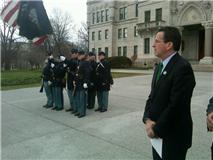 Attorney General George Jepsen has filed official opposition with the federal Bureau of Indian Affairs over proposed new rules that could make it easier for tribes like the Golden Hill Paugusetts to finally gain federal tribal recognition.
Attorney General George Jepsen has filed official opposition with the federal Bureau of Indian Affairs over proposed new rules that could make it easier for tribes like the Golden Hill Paugusetts to finally gain federal tribal recognition.
“The proposed rules would have a grave and unfair impact on Connecticut and should not be adopted in their current form,” Gov. Dannel P. Malloy said in a statement this morning in support of Jepsen. “Such a change would likely result in federal acknowledgement for groups that have made land claims to large areas of settled land here in Connecticut, and who have already been denied recognition after a long, intense, and fact-based federal process.”
“The proposed rules represent a dramatic departure from the standards and process governing acknowledgment decisions for nearly 40 years,” Jepsen said in a statement. “If adopted as proposed, petitioners could gain recognition in circumstances completely at odds with fundamental principles of tribal acknowledgement. These proposals – which could give previously denied petitioners a second bite at the apple under greatly weakened criteria – are unjustified and should be rejected.”
Currently, BIA rules require tribe to display proof of their “continuous community and political authority” since the first Europeans came to the state. Revisions proposed by the BIA in May would require only proof that the state has kept a reservation for a tribe since 1934.
The recognition of the Mohegans and the Mashantucket Pequots led to the two existing Indian casinos in Montville and Ledyard, respectively. The Paugusetts, who have wanted to put a casino in Bridgeport, have a quarter acre reservation in Trumbull and 106 acres in Colchester. They also filed extensive land claims.
The Schaghticoke Tribe has a 400-acre reservation in Kent, while the Paucatuck Eastern Pequots have 225 acres in North Stonington.
“Rather than improving transparency, predictability and finality, the proposed changes may undo settled decisions on which the state and others had expended significant resources and on which they have relied,” Jepsen said. “The continuous existence as a distinct community and the continuous exercise of political influence or authority within the group are central to the decision to acknowledge a tribe and to place them in a government-to-government relationship with the federal government. The proposed rules represent an unprecedented break from these established understandings of acknowledgement principles. There is no justification to permit the petitioners, and to require the interested parties to expend their resources, to litigate acknowledgement anew. The previously denied petitioners had a full and fair opportunity to prove their tribal existence. They failed. The proposed rule allowing re-petitioning should be eliminated so that the state and its most affected communities can be spared years of additional and unnecessary uncertainty.” The BIA’s deadline for comment was yesterday, when Jepsen filed the objections that were prepared by Jepsen, Assistant Attorney General Mark Kohler, head of the Special Litigation department, and Special Counsel Robert Clark.
http://www.ct.gov/ag/lib/ag/press_releases/2014/20140930_biacomments.pdf